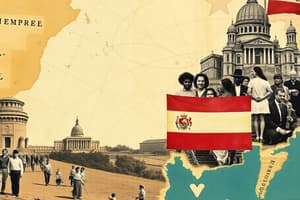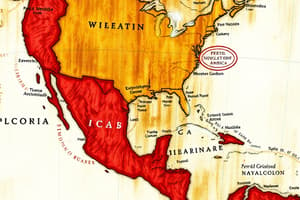Podcast
Questions and Answers
Which of the following is NOT a reason for exploration during the colonization era?
Which of the following is NOT a reason for exploration during the colonization era?
- Fame
- Scientific Discovery (correct)
- Wealth
- Curiosity
What role did colonies play in the mercantilism system?
What role did colonies play in the mercantilism system?
- Limit access to manufactured goods
- Only serve as labor pools
- Act as independent trading entities
- Provide raw materials and new markets (correct)
Which figure is associated with advocating for religious tolerance in the Massachusetts Bay Colony?
Which figure is associated with advocating for religious tolerance in the Massachusetts Bay Colony?
- William Penn
- Thomas Hooker
- Roger Williams (correct)
- John Rolfe
What was a significant impact of the Columbian Exchange on Native Americans?
What was a significant impact of the Columbian Exchange on Native Americans?
Which year marks the establishment of the Jamestown colony?
Which year marks the establishment of the Jamestown colony?
Who is recognized for cultivating tobacco and marrying Pocahontas?
Who is recognized for cultivating tobacco and marrying Pocahontas?
Which colony was founded by William Penn and emphasized religious tolerance?
Which colony was founded by William Penn and emphasized religious tolerance?
Which of the following individuals was banished from Massachusetts for challenging gender roles?
Which of the following individuals was banished from Massachusetts for challenging gender roles?
Flashcards
Reasons for Exploration
Reasons for Exploration
Motivations like seeking wealth, fame, or spreading religion, and the desire for national pride, faster trade routes, and curiosity all drove exploration in the Colonial era.
Reasons for Colonization
Reasons for Colonization
Political, Religious, Social, and Economic factors all contributed to English Colonization of North America.
Role of Colonies in Mercantilism
Role of Colonies in Mercantilism
Colonies in the Mercantilist system provided raw materials for the mother country and served as a market for their manufactured goods.
Positive Impact of Columbian Exchange
Positive Impact of Columbian Exchange
Signup and view all the flashcards
Key Events in Colonial Timeline
Key Events in Colonial Timeline
Signup and view all the flashcards
Roger Williams
Roger Williams
Signup and view all the flashcards
William Bradford
William Bradford
Signup and view all the flashcards
Anne Hutchinson
Anne Hutchinson
Signup and view all the flashcards
Study Notes
Exploration and Colonization
- Seven reasons for exploration include wealth, fame, religion, national pride, trade, faster trade routes, and curiosity.
- Four reasons for colonization are political, religious, social, and economic motivations.
- Under mercantilism, colonies provided raw materials and served as a market for manufactured goods.
- A positive effect of the Columbian Exchange on Native Americans was gaining access to new foods, technologies, and animals.
Columbian Exchange Negative Impact
- Native Americans were exposed to and died from diseases.
- Native Americans lost control of land they'd cultivated.
Timeline of Key Events
- 1607: Jamestown established
- 1620: Plymouth established
- 1776: Declaration of Independence (DOI).
- 1787: Northwest Ordinance
- 1803: Louisiana Purchase
Colonization-Era Figures
- Roger Williams: Notable figure for religious freedom.
- John Rolfe: Cultivated tobacco.
- John Smith: Early Jamestown leader.
- William Bradford: Plymouth governor.
- John Winthrop: Massachusetts Bay governor.
- Thomas Hooker: Connecticut founder.
- William Penn: Pennsylvania founder.
- James Oglethorpe: Georgia founder.
- Abigail Hutchinson: American singer and poet.
- Anne Hutchinson: Puritan leader, challenged gender roles.
- Lord Baltimore: Founded Maryland.
Studying That Suits You
Use AI to generate personalized quizzes and flashcards to suit your learning preferences.




